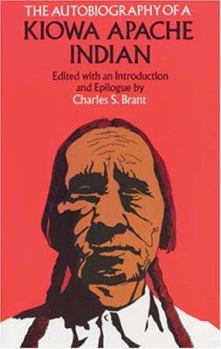The Autobiography of a Kiowa Apache Indian
Exciting autobiography of Jim Whitewolf, a Kiowa Apache born in the second half of the 19th-century, offers excellent inside-look at Indian culture. Preface. Introduction & Epilogue. Index. 1 map. This description may be from another edition of this product.
Format:Paperback
Language:English
ISBN:0486268624
ISBN13:9780486268620
Release Date:October 1991
Publisher:Dover Publications
Length:144 Pages
Weight:0.40 lbs.
Dimensions:0.4" x 5.4" x 8.4"
Customer Reviews
1 rating
The Story of Jim White Wolf
Published by Thriftbooks.com User , 16 years ago
This book is indicated as a companion text to `Prayer On Top of the Earth`, a book about the Kiowa or Plains Apache.(see my review of this also) Apache James (the Anglo name assigned to him by the boarding school) describes how he was sent to a boarding school and how the students there treated him, as well as how the administrators handled discipline. Some administrators were better than others. The lessons he learned there he used all the rest of his life. And his description of his jobs and chores was entertaining enough to hold my interest in his story. Once there was an effort made to introduce some familiarity with religion to the students there. James remembered the Minister man speaking words at Christmas, and at an official recognition of his marriage to a native girl. "The man was talking a whole bunch of words, but he didn't say anything." Many Apache had picked up some Spanish vocabulary, and the chiefs, more so than the others. This introduced a peculiar system of reliance on Indian guides in the west, where the Apache had the distinction of being sometimes less distinguishable from the Mexican residents. Since they all look alike to the white army people, they were never too certain whether to trust the brown or the red skins. But this working relationship with the Indian guides, wasn't only Apaches. When the Apache, Commanche and Kiowa were on the reservation, the chiefs were instructed to pick men who would work for the army to help find the renegade nomad Indians who wouldn't settle down on the reservation. Now James remembers his father telling how the soldiers would sometimes kill the wandering Indians when they found them just so as not to be bothered by them. (It was always considered an occupational hazard by the soldiers that any Indians they approached might try to kill them.) The chiefs instructed the trackers to warn the people, if they saw them first. Maybe I'm more than a little biased towards these people, but the tangled tale of James' courtship to his native wife is an unusually entertaining description of elopement, and then snaring the parents into the marriage agreement according to tribal `witness' customs. (I don't want to spoil it by revealing too much up front of what to expect.) Jim White Wolf is from a different tribe of Apache than Fig Tree John. And while confronting similar weaknesses, alcohol, white education, and divorce, his overall story is a lot more positive than John. Fig Tree John Then there is the most moving tale he heard from the elder people. How back in the days when the warriors used to go out on raids for cattle, or the wagon trains. And One time they took with them a youth and his older brother, who were cousins of James' father. They got into a battle with some pioneers on the trail, and some white people and some Indians were both killed. So the remaining white people fled. That youth who went with them for the very first time was shot by a rifle, which created a wound clear thro





